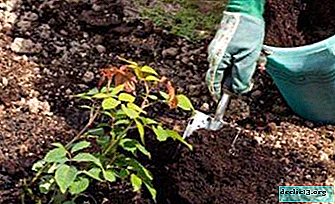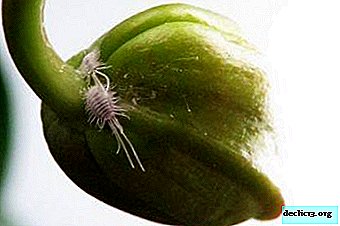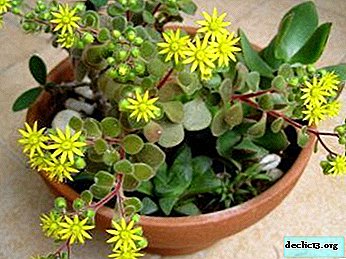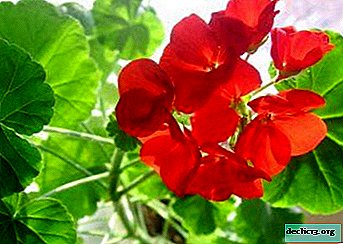Delicate rose Versilia: description and photo, tips on care and growing

The rose variety of unusually delicate peach color was bred by French breeders and named Versilia. The flower attracts special attention with its elegant, sophisticated look and captivates with worthy, from the point of view of gardeners, characteristics, including long, plentiful flowering, unpretentiousness and endurance.
French beauty with a delicate aroma will be a worthy decoration of the garden or porch.
Grade description
Versilia is a representative of the tea-hybrid rose group, an ideal cut variety. With proper care, including pruning, a compact bush is formed with erect strong shoots. Its width rarely exceeds 0.6-0.7 m and a height of 100-120 cm. The leaves of the plant are glossy, dark green, stems with a small number of thorns, which greatly facilitates the care and cutting.
1-3 flowers grow on the stem. Flowers with a diameter of 10-13 cm. One flower contains up to 30 rather large petals, the color of which is striking in its beauty: the saturated peach color in the middle gradually turns into overflows of pinkish, warm orange and milky cream shades, approaching the edges.
The benefits of roses include:
- long and plentiful flowering almost until winter;
- well-defined, pleasant aroma;
- beautiful, rather rare color:
- bush height - ideal for group plantings;
- great for cutting, stands in a vase for a long time, preserving its decorative qualities;
- large, amazingly beautiful flowers with velvet petals;
- the variety is well adapted to the conditions of the Russian climate.
The lack of variety Versilia only in the case that in case of improper care and violation of the rules of agricultural technology, the development of diseases such as bacterial cancer, powdery mildew, rust and others is possible. In general, the variety has good resistance to diseases, including fungal. Flowers are also resistant to drought, not afraid of rain, but it is worth noting that with increased humidity in the autumn, the risk of powdery mildew and black spotting increases. The variety is winter-hardy, but the plant needs shelter for a period of severe cold.
Photo
Below you will see a photo of roses of this variety:




History of occurrence
The creation of the variety was done by French breeders. Rosa Versilia was launched in 1996 by NIRP International. The variety was named after the former royal residence in the city of Versailles.
Bloom
With a good choice of planting location and proper care, the rose will delight with luxurious flowering throughout the season until the onset of cold weather.
When and how does it happen?
Specifically, when the rose begins to bloom, it is difficult. Much depends on what the weather will be like - cold or hot, rainy or dry. If conditions are favorable, flowering begins in mid-June and lasts until autumn frosts. On sturdy, stable stems, large buds are shaped in a goblet shape.
Attention! More often, one bud is formed on each shoot, but it happens that their number increases to 5. This does not affect the size of the flower, the blossoming rose will be as large. The revealed inflorescences hold their shape for a long time, and reach 13 cm in diameter.What is the difference from the rest of the species?
Variety Versilia is one of the most common and largest group of tea-hybrid roses, which has its own distinctive features. So, representatives of this species require mandatory pruning for the winter and shelter from frost. Dense and leathery leaves of tea-hybrid roses are less susceptible to disease than the varieties of other groups of this plant.
Features of care before and after flowering
 In order to achieve the lush flowering of this rose variety, all necessary agrotechnical actions should be carried out in time. Besides, for the formation of buds at the beginning of the season, the rose must be fed.
In order to achieve the lush flowering of this rose variety, all necessary agrotechnical actions should be carried out in time. Besides, for the formation of buds at the beginning of the season, the rose must be fed.
The best fertilizer for Versilia is rotten mullein mixed with superphosphate and potassium sulfate. The main thing is not to overfeed the flower.
It is important to remove faded roses in a timely manner. They are cut off without waiting for the final drying. This stimulates the formation of new buds.
What if there are no buds?
If there is no flowering, and there are no buds, and the foliage is actively growing, perhaps the soil is oversaturated with nitrogen. In this situation, fertilizers with a high content of phosphorus and potassium must be applied. During the period of budding, feeding with infusion of wood ash is practiced - 1 tsp. per liter of water.
Use in landscape design
Although Versilia is positioned as a cut variety, it should not be underestimated in the design of gardens and park areas. With a bewitching beauty, a rose can become the main “protagonist” of a flower garden or mixborder. It looks sophisticated and noble in both group and single landings, especially against the background of an emerald green lawn. Such a beauty will fit perfectly into any landscape style. To achieve maximum decorative effect, it is recommended to plant 5-8 bushes per square meter. m of soil.
Step-by-step care instructions
Choosing a landing place
When choosing a landing site, the following points should be considered:
- the best place is the south side of the site, well lit by the sun in the morning and afternoon;
- the rose loves a lot of light, but being under the rays of the sun for a whole day, it quickly fades, so it is better if the plant is in partial shade after 12 noon;
- You can not plant rose bushes under the crowns of trees, on the north side of the site, in lowlands;
- the place does not fit closely along the fence or wall of the building, the distance from them should be more than half a meter;
- a flower bed with roses should be ventilated, this will protect plants from pests and diseases, but protection from a strong cold wind and drafts is necessary.
Time
You can plant Versilia twice a year:
 In spring (late April - early May)when the earth warms up to +10 degrees Celsius.
In spring (late April - early May)when the earth warms up to +10 degrees Celsius.- Autumn (mid-September - second decade of October). It’s dangerous to shift the landing dates. If the autumn landing takes place earlier than the specified time, then due to the still warm weather, the rose can give young shoots that do not have time to get stronger before the cold weather. And if planted later, the rose does not have enough time to root.
What should be the soil?
The soil for hybrid tea Versilia should be fertile and breathable, with an acid-base reaction of 5.6-7.3 pH. To improve heavy clay soils, sand, peat, humus or compost are added to them. Clay soil is added to too light sandy soils with the addition of turfy soil, peat compost.
Seedling preparation and planting
For planting, choose seedlings in which 2-4 strong green shoots grow from the place of vaccination. Saplings with an open root system should not have leaves, with closed - leaflets are acceptable. First of all, planting pits of 50x50 cm are prepared, with a depth of 40-60 cm. 5 kg of soil mixed with humus are filled in them. So that the soil has time to settle, it is better to do this in advance, 1-2 weeks before the day of planting. Immediately before planting, a bucket of water (8-10 l) is poured into each prepared hole. After its absorption, the bottom is tamped and soil is poured.
It is advisable to shorten the shoots, remove the very weak ones. Each of them should have from 3 to 5 kidneys. To stimulate growth, you need to trim the roots, remove long and damaged. The seedling is immersed in the hole so that the root neck is located 3 cm below the soil level. Tamp the ground around the plant and watered abundantly.
Reference. Before planting, rose seedlings are recommended to hold for 4-6 hours in water.Growing conditions
For a good growth and development of a rose bush, certain conditions are necessary:
- Temperature. The plant loves moderate temperature, without sharp fluctuations. The most optimal indicators are 20-25 degrees of heat.
- Watering. Rose is contraindicated in too frequent watering. Highly waterlogged soil increases the risk of root rot. In summer, watering is carried out once every 5-7 days, closer to autumn - once every two weeks, then, especially in rainy weather, gradually stop.
 Top dressing. At least 4 top dressings are carried out per season. To make fertilizer around the plant, make a groove with a diameter of about 30 cm, which is first shed with water, then fertilizer in liquid form. In June, before flowering begins, potash and nitrogen fertilizers are applied. Use mineral complexes and universal fertilizers for flowering plants. In the flowering phase, top dressing is not carried out.
Top dressing. At least 4 top dressings are carried out per season. To make fertilizer around the plant, make a groove with a diameter of about 30 cm, which is first shed with water, then fertilizer in liquid form. In June, before flowering begins, potash and nitrogen fertilizers are applied. Use mineral complexes and universal fertilizers for flowering plants. In the flowering phase, top dressing is not carried out.- Weeding. Weeds must not be allowed to grow in both summer and autumn. They draw moisture and substances useful for roses from the soil. Weeding is better in dry weather, so the weeds will dry faster. When using a garden tool, make sure that its blade does not penetrate the soil more than 3 cm.
- Loosening improves air exchange in the soil. Loosen the soil around the bush after watering, when moisture is absorbed. Deep loosening is unacceptable, it can harm the roots. Adult bushes loosen in early spring, when thawing the soil, after top dressing, and before shelter for the winter.
- Mulching. This technique helps to control weeds, improves soil properties and prevents soil compaction. A layer of 4-6 cm mulch laid around the bush is enough.
Pruning
Preventive pruning is done twice. In autumn, diseased and damaged stems are removed, thinning of immoderately overgrown plants is performed. In spring, the tops of the shoots are cut, and the stems affected by frost are also removed.
Important! When pruning a Versilia rose, it is worth considering that the variety blooms on the shoots of the current year.Forming cropping:
- Spring - held in the second year. Last year's shoots are left (up to 5), pruning so that from the soil surface there are from 1 to 6 buds.
- Summer - on old bushes cut flowers to the first bud under them, which is directed outward. On young bushes, such pruning is not done.
- Autumn - It is carried out in November; shoots of 40-45 cm are left. Shorter shoots cannot be made, their indicated height is necessary for a successful wintering.
How to propagate?
 Roses propagate by cuttings. Only this method of propagation of tea-hybrid roses allows you to maintain varietal quality of the culture. Cuttings are taken from healthy, young bushes. The length of the handle is 10-15 cm, the lower cut at an angle of 1 cm below the kidney.
Roses propagate by cuttings. Only this method of propagation of tea-hybrid roses allows you to maintain varietal quality of the culture. Cuttings are taken from healthy, young bushes. The length of the handle is 10-15 cm, the lower cut at an angle of 1 cm below the kidney.
The scion site is cleaned of the earth, washed with standing water at room temperature. The grafted stalk is wrapped with cling film, creating a greenhouse effect, and left alone for two weeks. After a while, they look to see if the stalk has grafted.
Preparation for winter
Rosa needs shelter. It is necessary to warm Versilia not before stable cold weather sets in. Usually, fir spruce branches are used for shelter, which are placed on top of the bushes and between them. You can use dry grass and leaves. Then, frames are installed over the plants from the rails, profile or greenhouse arches. A heater is placed on top of the frame, and the structure is covered with a film, leaving side vents.
Diseases and Pests
Hybrid tea rose Versilia can be threatened by such insect pests:
- Leaflet - butterflies, small caterpillars of which damage buds, leaves and shoots. For elimination, bacterial preparations, decoctions of onions, garlic and tobacco are used.
- Aphid - appears in the spring and multiplies rapidly. It sucks juice from plants, which weakens them. Aphids should be fought with insecticides (Actara, Actellik), soap solution, decoctions of pepper, tobacco.
- Spider mite - arachnids, very small. They form a web on the underside of leaves, which subsequently turn yellow and fall off. To get rid of it is required to process rose bushes with insecticides three times (at intervals of 5 days). Affected leaves are collected and burned.
More often tea hybrid varieties affect fungal diseases:
- rust;
- gray rot;
- powdery mildew;
- black spotting.
Spectacular and charming Versilia requires constant attention, but the beauty of this rose deserves all the efforts spent on its cultivation. This is a great variety for breeding in the garden, near the house. Peach beauty will not leave anyone indifferent.

 In spring (late April - early May)when the earth warms up to +10 degrees Celsius.
In spring (late April - early May)when the earth warms up to +10 degrees Celsius. Top dressing. At least 4 top dressings are carried out per season. To make fertilizer around the plant, make a groove with a diameter of about 30 cm, which is first shed with water, then fertilizer in liquid form. In June, before flowering begins, potash and nitrogen fertilizers are applied. Use mineral complexes and universal fertilizers for flowering plants. In the flowering phase, top dressing is not carried out.
Top dressing. At least 4 top dressings are carried out per season. To make fertilizer around the plant, make a groove with a diameter of about 30 cm, which is first shed with water, then fertilizer in liquid form. In June, before flowering begins, potash and nitrogen fertilizers are applied. Use mineral complexes and universal fertilizers for flowering plants. In the flowering phase, top dressing is not carried out.















